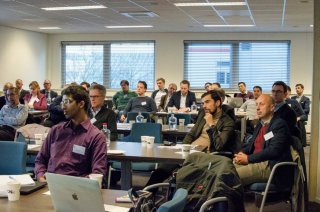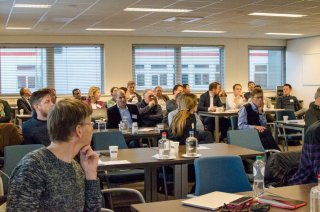Big Data: Mathematics in Action!
The Big Data section of the Applied Mathematics Institute of the 4TU federation (4TU-AMI) has held an informal symposium on Friday afternoon, November 24, with about 50 participants from academia and industry.The goal was to strengthen the connections between applied quantitative research at the Dutch universities of technology and private partners.
Date & Time: November 24, 2017 at 13:30 hrs.
Location: BCN Utrecht, Daltonlaan 100, Utrecht
Presentations
Alessandro Di Bucchianico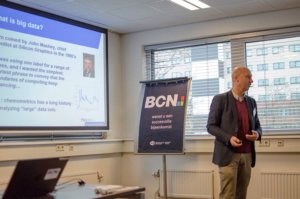
Title: The Mathematics behind Big Data
Abstract: In this talk I will show through explicit examples the often unnoticed important role of mathematics in Big Data developments. These examples are shown to stimulate new collaborations of researchers from mathematics and other scientific disciplines with industrial partners in order to solve challenges and make use of the opportunities with Big Data.
Bio: Alessandro Di Bucchianico is Associate Professor of Statistics at Eindhoven University of Technology working on statistical process control and reliability. He is member of the Board of the Data Science Center Eindhoven and the Innovation Committee of Platform Wiskunde Nederland, Director of the Permanent Office of the European Network of Business and Industrial Statistics, as well one of the two coordinators of the Dutch Studygroups Mathematics with Industry.
Mark Roest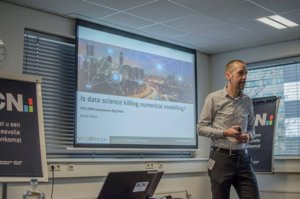
Title: Is big data killing numerical mathematics?
Abstract: When you read the popular press, it may seem that data science can do almost anything. Just collect a load of data, do some smart machine learning and you're done. That sounds like a huge improvement from the old days of hard work on mathematical modelling: carefully trying to understand systems, develop the partial differential equations and then solve them (usually at a huge computational cost). The truth is, probably, that data science and mathematical modelling are complementary. There are topics that are better handled with data science, there are topics that are best handled by the more traditional mathematical modelling. And then there are topics that can benefit from both. The talk is meant to share some thoughts with the audience, not to make any definite statements. The field of data science is evolving too fast for that.
Bio: Mark Roest is managing director (and one of the founders) of VORtech, a company of scientific software engineers and data scientists. He also acts as a consultant, where he has two main focus areas. The first is helping companies define data-science projects. The second is helping companies to manage and maintain their computational software.
Igor Stojkovic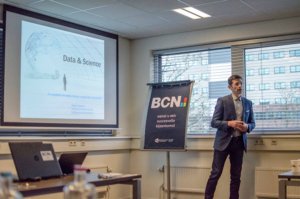
Title: Data & Science --- a mandate for data driven corporate innovation
Abstract: In this talk we shall take a glimpse upon what working in data science profession in a corporate setting factually entails, what agile data driven teams look like and what challenges do such professionals have to handle.
By example of specific engagements where speaker has worked on in the past key aspects of devising data driven solutions will be discussed: understanding of the actual business need, translating it to an analytical framework, data hunting, data preparation, experiment design, feature engineering, modelling choices, training, performance evaluation and finally deployment, model lifecycle and stakeholder management & communication within the organization.
Bio: Igor Stojkovic has obtained his PhD at Leiden University at the Analysis group of the Mathematical Institute of Leiden University in 2011 and after a one year postdoc appointment at TU Delft he left academia to work in the banking industry with the ABNAMRO Bank. There he has been one of the founders of the Bank’s data science division, and in the final stages in the role of the principle data scientist of the IT Solutions of ABNAMRO. Since recently Igor works at Phillip Morris International as technical data science lead of the Amsterdam office of Enterprise Analytics and Data department.
Stella Kapodistria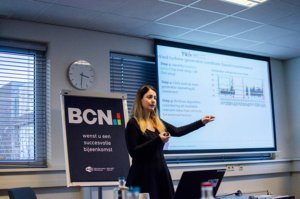
Title: Big data: Predictive maintenance
Abstract: Maintenance is an important way to increase system dependability: timely inspections, repairs and renewals can significantly increase a system's dependability and lifespan. At the same time, maintenance incurs costs and downtime. Thus, good maintenance planning has to balance between these factors. In this presentation, I will explore the concepts behind predictive maintenance: by understanding the system health better, failures can be predicted better, and just-in-time maintenance can be performed. In that way, maintenance is only performed when needed, so that cost can be saved.
In my research I use a combination of models (esp fault trees) and big data analytics to model and analyze the costs and performance of maintenance strategies. I will discuss two case studies from railroad engineering, namely the electrically insulated joint, and the train compressor.
